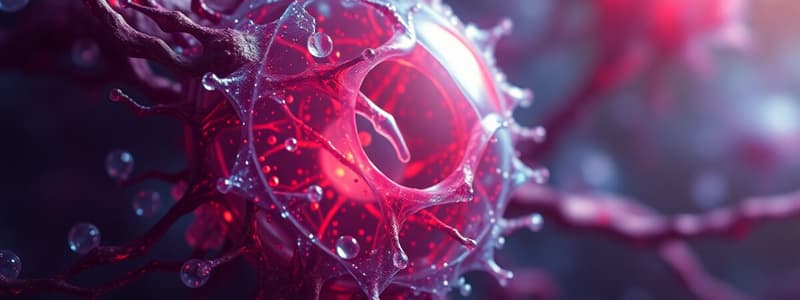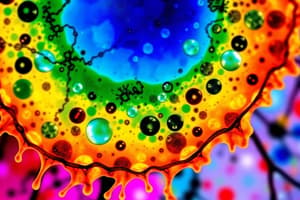Podcast
Questions and Answers
What key component do all known living things share according to cell theory?
What key component do all known living things share according to cell theory?
- A membrane-bound nucleus
- One or more cells (correct)
- The ability to reproduce sexually
- A central nervous system
Which of the following is NOT a characteristic of prokaryotic cells?
Which of the following is NOT a characteristic of prokaryotic cells?
- Contain membrane-bound organelles (correct)
- Typically smaller than eukaryotic cells
- Include bacteria and archaea
- Possess a nucleoid region
What evidence primarily supports the idea that cells arise from pre-existing cells?
What evidence primarily supports the idea that cells arise from pre-existing cells?
- Microscopic structure of viruses
- Chemical processes within cellular compartments
- Observation of mitosis and meiosis (correct)
- Variability in cell sizes among organisms
Which of the following best describes the role of microscopy in the development of cell theory?
Which of the following best describes the role of microscopy in the development of cell theory?
Which of the following statements is true regarding viruses?
Which of the following statements is true regarding viruses?
What aspect of cellular biochemistry supports the cell theory?
What aspect of cellular biochemistry supports the cell theory?
Which of the following organelles is found in eukaryotic cells but not prokaryotic cells?
Which of the following organelles is found in eukaryotic cells but not prokaryotic cells?
What is an acellular organism, as per the content?
What is an acellular organism, as per the content?
How has cell theory contributed to medical advances?
How has cell theory contributed to medical advances?
Which statement regarding the debate on the origin of life is accurate?
Which statement regarding the debate on the origin of life is accurate?
Flashcards
Cell Theory: Postulate 1
Cell Theory: Postulate 1
All living organisms are composed of one or more cells. Cells are the basic structural and functional units of life.
Cell Theory: Postulate 3
Cell Theory: Postulate 3
Cells arise only from pre-existing cells. This means new cells are formed by the division of existing cells.
Microscopy Evidence
Microscopy Evidence
Early microscopes allowed scientists to observe cells, providing initial evidence for the existence of fundamental units in living organisms.
Cellular Biochemistry Evidence
Cellular Biochemistry Evidence
Signup and view all the flashcards
Cell Division Evidence
Cell Division Evidence
Signup and view all the flashcards
Prokaryotic Cells
Prokaryotic Cells
Signup and view all the flashcards
Eukaryotic Cells
Eukaryotic Cells
Signup and view all the flashcards
Viral Exception
Viral Exception
Signup and view all the flashcards
Importance of Cell Theory
Importance of Cell Theory
Signup and view all the flashcards
Cell Theory's Medical Impact
Cell Theory's Medical Impact
Signup and view all the flashcards
Study Notes
Key Postulates of Cell Theory
- All known living things are composed of one or more cells.
- The cell is the basic structural and functional unit of all living organisms.
- All cells arise from pre-existing cells.
Evidence Supporting Cell Theory
- Microscopy: Early microscopes revealed cellular structures, supporting the idea of fundamental units. Improved technology allowed further observations, strengthening the theory.
- Cellular Biochemistry: Studies of the chemical processes within cells demonstrated that the basic metabolic activities of life occur within cellular compartments.
- Cell division: Observation of mitosis and meiosis showed that cells arise from pre-existing cells through a process of division, crucial to the maintenance and reproduction of organisms.
- Organismal development: Study of the development of organisms from single cells to complex structures reinforces the concept of cells as fundamental units.
Cell Types and Structure
- Prokaryotic Cells: These cells lack a membrane-bound nucleus and other membrane-bound organelles.
- Typically smaller than eukaryotic cells.
- Examples include bacteria and archaea.
- Possess a nucleoid region (where genetic material is located) and ribosomes.
- Eukaryotic Cells: These cells contain a membrane-bound nucleus and various organelles.
- Larger and more complex than prokaryotic cells.
- Examples include plant, animal, fungi, and protist cells.
- Feature membrane-bound organelles such as mitochondria, endoplasmic reticulum, Golgi apparatus, and chloroplasts (in plant cells).
- More specialized and compartmentalized
Exceptions and Considerations
- Viruses: Viruses are considered non-living because they lack cellular structures and can only reproduce within a host cell.
- Acellular organisms: Certain organisms like prions and viroids are not considered alive because they lack cells and have very simple structure.
- Debate on the origin of life: The exact nature of the first cell and its precursors is a subject of ongoing research and debate.
Importance of Cell Theory
- Foundation of Biology: The cell theory is fundamental to understanding how organisms function and reproduce.
- Medical Advances: The theory has driven research into cellular processes to develop therapies for diseases like cancer and genetic disorders.
- Evolution: Understanding cell structure and function has implications in understanding the common ancestry of all living organisms.
- Applications: This theory is fundamental in fields like biotechnology, agriculture, and pharmaceuticals.
Studying That Suits You
Use AI to generate personalized quizzes and flashcards to suit your learning preferences.




